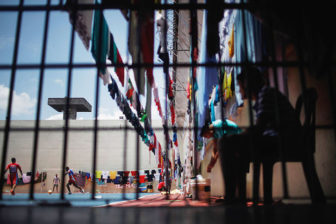Brazil may be the world’s seventh-largest economy and highly visible on a global scale, but it is, in many ways, remarkably isolated from the rest of the world and from global threats like terrorism.
At least most thought it was.
The arrests in recent days of 12 Brazilians suspected of plotting to carry out attacks during the Rio Olympics has thrust terrorism to the center of national debate and shattered notions that the South American giant might be spared as a terror target – not to mention added another challenge for authorities already battling a host of issues from construction delays to basic security concerns.
But the incident also provides an opportunity for Brazil to address weaknesses in its counterterrorism framework, specifically on three fronts: professionalizing law-enforcement, promoting international cooperation to better respond to threats and strengthening the country’s role in the global debate about terrorism.
Terrorism is a genuinely new concern for Brazil, one of the few major countries never to have suffered from the scourge so common in many other parts of the world. Contrary to Peru, Colombia and Argentina, which faced terrorist threats in the past (incidentally, this week marks the 22nd anniversary of the bombing of a Jewish community center in Buenos Aires), Brazil has never seen anything like the recent attacks in Orlando, Nice or Paris.
Now, Brazil has the chance to learn from other countries. Evidence from Buenos Aires and New York suggests that adopting policies to strengthen police counterterrorism capacity can help combat other types of crime and improve police performance in general. The specter of terrorism also has the potential to spur better monitoring of security threats in urban areas as well as tighter control over Brazil’s porous international borders, which are notorious for the smuggling of drugs, weapons and people.
Enhancing law enforcement’s counterterrorism capacity will also help the fight against corruption, money laundering and tax evasion. It should not be forgotten that the Lava Jato investigation, which uncovered endemic corruption among Brazil’s political and business elites, would not have been viable without new rules on financial transparency adopted after the terrorist attacks of September 11, 2001.
As Latin America’s largest country, Brazil has a role to play in promoting counterterrorism practices. This includes regional cooperation in the adoption of rules in new areas such as the use of drones, cybersecurity, the training of anti-bomb squads and best practices at screening at airports, train stations and public events. Notably, it was only last week that Brazilian airports adopted international passenger-screening standards (which involve removing laptops from bags, etc.) for domestic travelers.
Indeed, these are fairly new concepts for Brazil, whose policymakers have long been happy to remain largely off the radar when it comes to troubling issues like terrorism and the global debate about how to deal with it. Even with Brasília’s recent ratification of a new and highly controversial anti-terrorism law, discussions about the topic have been restricted to a relatively small group of analysts and policymakers.
It is no coincidence that Samuel Pinheiro Guimarães, a high-ranking diplomat during the Lula administration, published a book called “500 Years on the Periphery” shortly before becoming right-hand man to influential former Foreign Minister Celso Amorim. Particularly in the realm of security such an outlook has prevailed, in part, because foreign trade is relatively small and the foreign-born population is only 0.3 percent, compared to above 10 percent in countries like the U.S. and U.K.
But given the growing threat of terrorism to global stability, Brazil can no longer remain on the periphery of this discussion – especially if it has ambitions to play a more important role internationally. At a time when globalization produces security threats that are largely transnational in nature, and which require concerted cooperation between governments, enhancing Brazil’s counterterrorism capacity will allow policymakers to better engage in high-level anti-terrorism strategizing, be it at the United Nations or the yearly Munich Security Conference.
Most importantly, it will make Brazil safer. Such would be a silver lining to terrorism concerns around the Rio Olympics.







